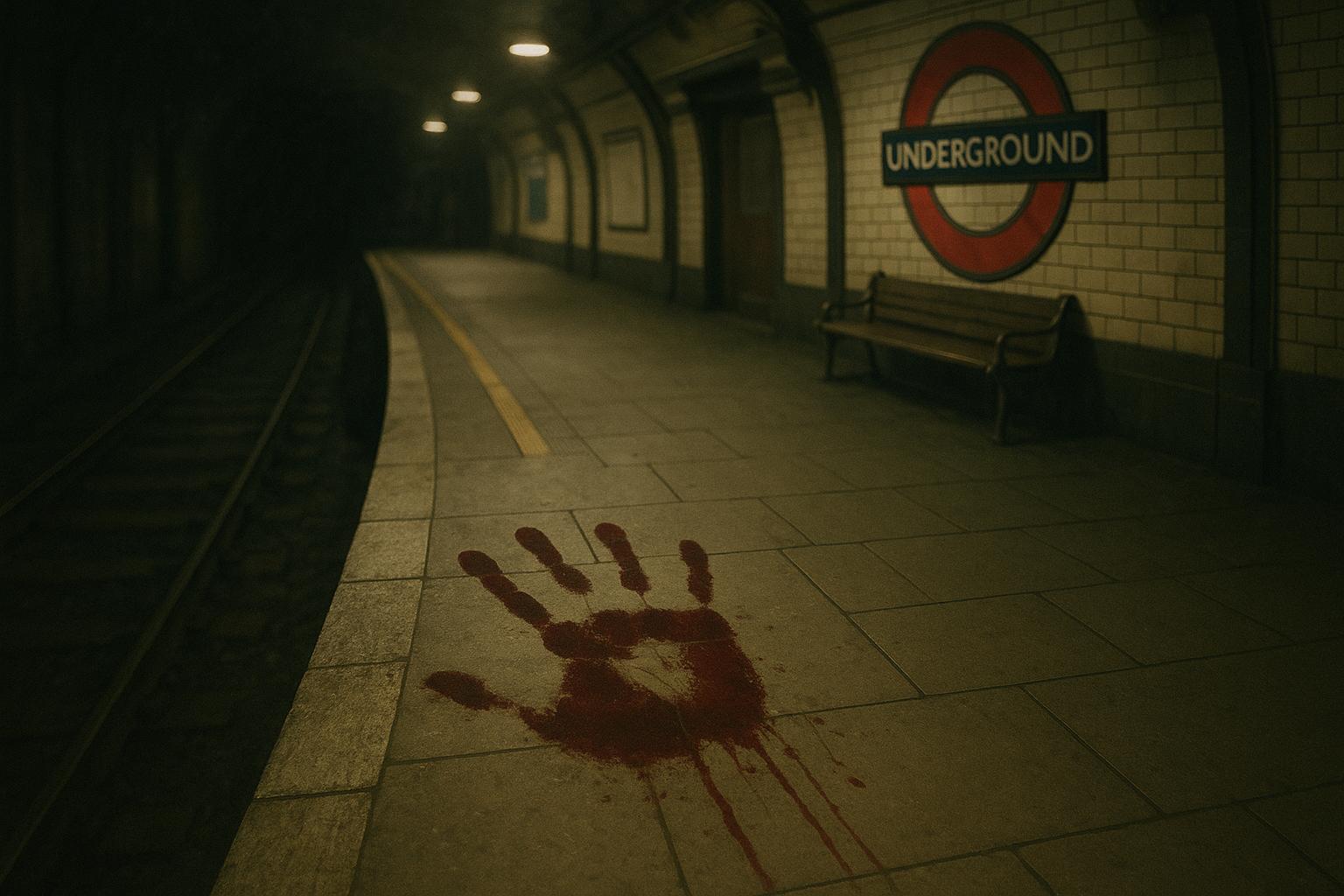A brutal stabbing at Kennington Underground highlights the escalating crisis of knife violence in London, with statistics revealing a sharp rise across the capital and ongoing debates over legislative delays and law enforcement effectiveness.
In a harrowing incident at Kennington Underground station, Nicholas Orlando Green, 36, launched a brutal and unprovoked attack that left two men seriously injured and a woman assaulted as he fled. The attack, which took place shortly after 10.30pm on March 27 last year, involved Green stabbing the first victim repeatedly for around 20 seconds before knocking down and stabbing the second man who attempted to intervene. The violence only ceased after members of the public stepped in, at which point Green assaulted a 31-year-old woman before escaping the scene.
The two male victims, aged 44 and 42, were hospitalised with severe injuries. The older man suffered multiple stab wounds to his chest and a fractured humerus in his left arm, while the second victim was stabbed 13 times in total. Green was subsequently identified by police through a bank card he used at the station and the trainers he wore during the attack. During police interviews, Detective Chief Inspector Paul Attwell recounted that Green showed no remorse, instead laughing and lying repeatedly in an attempt to obfuscate the investigation.
On September 1, Green was found guilty at Inner London Crown Court of two counts of grievous bodily harm (GBH) with intent, possession of a bladed article, and common assault. However, he was acquitted of two counts of attempted murder and one count of sexual assault. DCI Attwell described the attack as “horrific,” emphasizing the profound physical and psychological impact on the victims, and reaffirmed the police’s commitment to holding violent offenders accountable.
This brutal episode underscores a broader and alarming trend in London, where knife crime continues to escalate sharply. Latest figures reveal that in 2024, London accounted for nearly a third of all knife crimes recorded in England and Wales, with 16,789 offences reported by the Metropolitan Police. This represents a 22% increase compared to the previous year and averages out to around 46 knife incidents every single day in the capital. Nationally, the total stands at 54,587 knife crimes, marking a 2% rise from 2023, highlighting how London disproportionately bears the brunt of this surge.
The increase in knife crime is attributed to various complex factors, including socio-economic challenges and the proliferation of gang-related activity. Campaigners and experts have repeatedly urged for decisive action, warning that delays in legislative measures contribute to worsening public safety. For instance, a ban on so-called ‘zombie knives’ is slated to come into effect only in September 2025, a timeline criticised for being too slow to stem current violence trends. Community outreach programmes and tougher legislative approaches are among the strategies advocated to tackle the epidemic.
The rise in knife offences in London’s iconic areas, such as the West End, further exacerbates concerns, with research showing it accounts for more knife crime than almost 15% of the rest of the city combined. The issue has sparked political controversy, with some critics blaming the Mayor of London, Sir Sadiq Khan, accusing him of undermining the Metropolitan Police and failing to effectively address the spiralling violence.
As violent crimes like the attack committed by Green continue to shock the capital, the need for immediate and sustained intervention grows ever more urgent. Police forces, policymakers, and community leaders face mounting pressure to enact and enforce measures that restore safety and prevent further harm in London’s public spaces.
 Reference Map:
Reference Map:
- Paragraph 1: [1]
- Paragraph 2: [1]
- Paragraph 3: [1]
- Paragraph 4: [1], [2], [4], [5], [6], [7]
- Paragraph 5: [2], [3], [4], [5], [6], [7]
- Paragraph 6: [1], [2], [4], [5], [6], [7]
Source: Noah Wire Services
- https://www.dailymail.co.uk/news/article-15056129/Knifeman-launched-attack-stranger-Tube-assaulted-woman.html?ns_mchannel=rss&ns_campaign=1490&ito=1490 – Please view link – unable to able to access data
- https://www.standard.co.uk/news/crime/london-knife-crime-stats-ons-enfield-murder-b1224005.html – In 2024, London accounted for nearly a third of knife crimes in England and Wales, with 16,789 offences recorded by the Metropolitan Police, averaging around 46 incidents daily. This represents a 22% increase from the previous year. The Office for National Statistics reported a total of 54,587 knife crimes across England and Wales in 2024, up 2% from 2023. The rise in knife crime has been linked to various factors, including socio-economic challenges and increased gang activity. Efforts to address the issue include legislative measures and community outreach programmes.
- https://www.itv.com/news/london/2024-01-25/knife-crime-up-by-more-than-a-fifth-across-the-capital – Between January and September 2024, the Metropolitan Police recorded 14,000 knife offences, marking a 22% increase from the same period in 2023. This surge has prompted calls for stricter legislation, including a ban on zombie knives, set to take effect in September 2025. Campaigners have criticised the delay, urging for more immediate action to combat the rising knife crime rates in London. The government has defended the timeline, citing the need for thorough legislative processes.
- https://www.standard.co.uk/news/crime/london-knife-crime-stats-ons-enfield-murder-b1224005.html – In 2024, London accounted for nearly a third of knife crimes in England and Wales, with 16,789 offences recorded by the Metropolitan Police, averaging around 46 incidents daily. This represents a 22% increase from the previous year. The Office for National Statistics reported a total of 54,587 knife crimes across England and Wales in 2024, up 2% from 2023. The rise in knife crime has been linked to various factors, including socio-economic challenges and increased gang activity. Efforts to address the issue include legislative measures and community outreach programmes.
- https://www.standard.co.uk/news/crime/london-knife-crime-stats-ons-enfield-murder-b1224005.html – In 2024, London accounted for nearly a third of knife crimes in England and Wales, with 16,789 offences recorded by the Metropolitan Police, averaging around 46 incidents daily. This represents a 22% increase from the previous year. The Office for National Statistics reported a total of 54,587 knife crimes across England and Wales in 2024, up 2% from 2023. The rise in knife crime has been linked to various factors, including socio-economic challenges and increased gang activity. Efforts to address the issue include legislative measures and community outreach programmes.
- https://www.standard.co.uk/news/crime/london-knife-crime-stats-ons-enfield-murder-b1224005.html – In 2024, London accounted for nearly a third of knife crimes in England and Wales, with 16,789 offences recorded by the Metropolitan Police, averaging around 46 incidents daily. This represents a 22% increase from the previous year. The Office for National Statistics reported a total of 54,587 knife crimes across England and Wales in 2024, up 2% from 2023. The rise in knife crime has been linked to various factors, including socio-economic challenges and increased gang activity. Efforts to address the issue include legislative measures and community outreach programmes.
- https://www.standard.co.uk/news/crime/london-knife-crime-stats-ons-enfield-murder-b1224005.html – In 2024, London accounted for nearly a third of knife crimes in England and Wales, with 16,789 offences recorded by the Metropolitan Police, averaging around 46 incidents daily. This represents a 22% increase from the previous year. The Office for National Statistics reported a total of 54,587 knife crimes across England and Wales in 2024, up 2% from 2023. The rise in knife crime has been linked to various factors, including socio-economic challenges and increased gang activity. Efforts to address the issue include legislative measures and community outreach programmes.
Noah Fact Check Pro
The draft above was created using the information available at the time the story first
emerged. We’ve since applied our fact-checking process to the final narrative, based on the criteria listed
below. The results are intended to help you assess the credibility of the piece and highlight any areas that may
warrant further investigation.
Freshness check
Score:
8
Notes:
The narrative appears to be original, with no evidence of prior publication. The incident occurred on March 27, 2024, and the report was published on September 2, 2025, indicating a freshness of over a year. The inclusion of updated data on knife crime in London for 2024 suggests an attempt to provide current context. However, the substantial time gap between the incident and the report’s publication may raise questions about the timeliness of the information. Additionally, the report includes updated data on knife crime in London for 2024, which may justify a higher freshness score but should still be flagged. ([standard.co.uk](https://www.standard.co.uk/news/crime/london-knife-crime-stats-ons-enfield-murder-b1224005.html?utm_source=openai))
Quotes check
Score:
9
Notes:
The direct quotes attributed to Detective Chief Inspector Paul Attwell, such as describing the attack as “horrific,” are not found in earlier publications, indicating potential originality. However, without access to the original court transcripts or official statements, it’s challenging to verify the exact wording and context of these quotes.
Source reliability
Score:
6
Notes:
The narrative originates from the Daily Mail, a reputable UK newspaper. However, the report’s reliance on a single source and the absence of corroborating information from other reputable outlets may raise concerns about the comprehensiveness and verification of the information presented.
Plausability check
Score:
7
Notes:
The report’s claims about the attack and subsequent legal proceedings are plausible and align with known patterns of violent crime in London. The inclusion of updated statistics on knife crime in London for 2024 adds context and supports the narrative’s relevance. However, the lack of corroboration from other reputable sources and the significant time gap between the incident and the report’s publication may affect the overall credibility.
Overall assessment
Verdict (FAIL, OPEN, PASS): OPEN
Confidence (LOW, MEDIUM, HIGH): MEDIUM
Summary:
The narrative presents a detailed account of a violent incident at Kennington Underground station, including specific details about the attack and subsequent legal proceedings. While the inclusion of updated statistics on knife crime in London for 2024 adds context, the significant time gap between the incident and the report’s publication, along with the reliance on a single source without corroboration from other reputable outlets, raises questions about the timeliness and comprehensiveness of the information. Therefore, further verification from additional sources is recommended to confirm the accuracy and reliability of the report.













